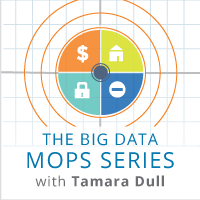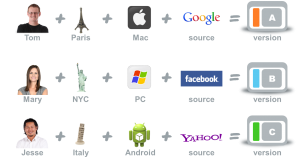
We have a love/hate relationship with ads. Whether they’re on television, in our favorite publications, or online, we love them if they’re relevant and interesting, or get annoyed when they get in the way of [insert whatever we’re doing]. I have to admit: I rarely watch a television show in real-time anymore. I’ll record a show, wait 20+ minutes, and “chase the show” with the recording—ad-free.
So what does this have to do with big data privacy, the “soapbox” I’ve been standing on for weeks? (Ha!) Well, some would have you believe that the big data privacy debate is all about online advertising—i.e., you get interesting, relevant ads in exchange for your personal information. If this what you believe, you’re sort of missing the point. Read on and see if you agree.
About online advertising. Do you remember September 3rd when Facebook had an 18-minute outage? Given that Facebook generates about $22,000 per minute, this means they lost almost $400K during that outage. This may sound like a drop in the bucket for them, but if you add in all the lost revenue from all the businesses who generate ad revenue on Facebook’s platform, a lot more than $400K was lost.

Advertising is big money, and behavioral online advertising is even bigger money – and companies like Facebook, Google, and Yahoo! get that. They know what we’re clicking, posting, liking, and commenting on, and they’re using this information to better target us for advertisers. And contrary to popular belief, when it comes to advertising and privacy, advertisers really don’t care about what we do or where we go. They only care about one thing: getting us to buy whatever they’re selling.
Why this matters. You may be thinking, “So what? What’s the harm?” I mean, who doesn’t appreciate a targeted ad when you’re surfing for a certain item online or a coupon delivered to your smartphone when you’re near one of your favorite stores? It seems like a harmless trade-off: a little bit of your personal information in exchange for some helpful, free service that could help save you some money.
But here’s the catch: the information we freely share is not just used by these advertisers selling stuff to us. It’s being used, bought, and sold by a lot of other data “players”—some good, some bad, some we’ve given explicit permission to, some we haven’t—and none of which we have any control over.
The big data privacy debate is not just about online advertising—or even the collection of data. It’s about who’s using our data, why they’re using it, and how we can protect ourselves from privacy invasions when we don’t even know who’s watching us. It’s about you, me, them, and us.
The bottom line. Vigilance, not apathy, is the right response to the opportunities and challenges this big data era is ushering in. Be mindful of what you click and share. If you don’t click it or share it, “they” can’t use it or abuse it.
Originally written for and published on Smart Data Collective as part of the Big Data MOPS Series.
Editor's note:
We all get it now - big data is both a challenge and an opportunity for marketers. And the opportunity is realized by applying analytics to garner the insights that lead to better marketing. And big data is really BIG - so the data now available to marketers is like a digital "horn of plenty," a virtual cornucopia just overflowing with potential information.
And the point for marketers in Tamara's post here is analogous to the message of this biblical parable once used by John F. Kennedy:
To those whom much is given, much is expected.
As the steward of the customer relationship, marketing can't just harvest and use the truckloads of customers' personal data irresponsibly - it's reasonable that we'd be expected to safeguard it and respect the rights of the owners of that data.
There's more information on consumer's expectations regarding digital behavior and personalization that you can read in this report based on a global study SAS conducted this year:
Finding the Right Balance Between Personalization and Privacy
Check it out and let us know what you think!

1 Comment
Pingback: Are you kidding me, Facebook? Oh, you got it right. - Customer Analytics